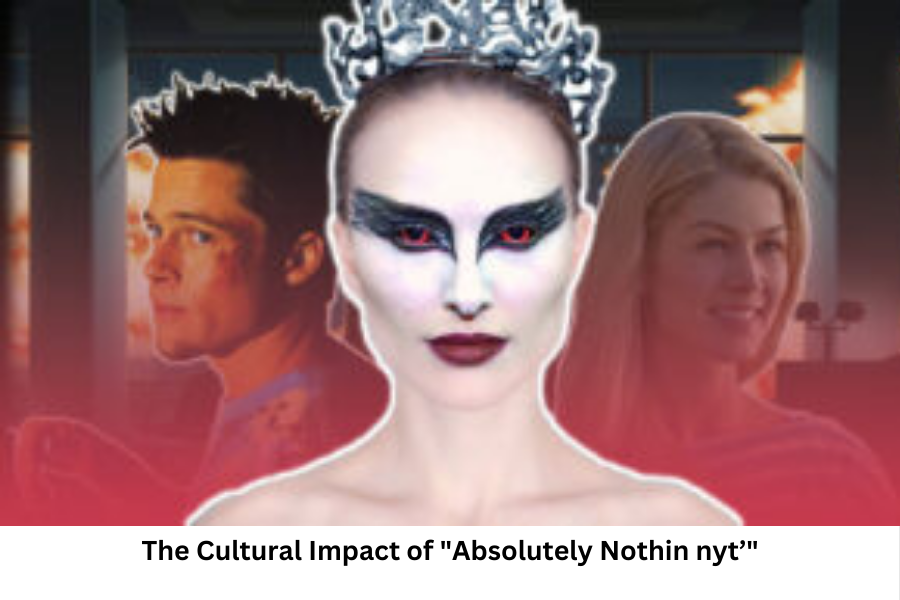Introduction
“Absolutely Nothin nyt’” is a phrase that has transcended its origins in the 1970 hit song War by Edwin Starr to become a global symbol of resistance, protest, and societal critique. It captures the sentiment of frustration and disillusionment felt by many individuals who challenge the status quo. The phrase, while simple, has evolved over decades, gaining new layers of meaning and application in diverse contexts, including social movements, activism, and artistic expression. This article explores the origins, the widespread usage of the phrase in various social causes, and its enduring presence in modern culture.
The Origins of “Absolutely Nothin nyt’”
The phrase “Absolutely Nothin nyt’” was first made famous by the iconic song War, written by Norman Whitfield and Barrett Strong, and performed by Edwin Starr. Released in 1970 during the height of the Vietnam War, War became a powerful anthem for the anti-war movement, criticizing the futility of conflict and the unnecessary loss of life. The chorus, which includes the line “War, huh, yeah, what is it good for? Absolutely nothin’,” encapsulated the raw emotion and sentiment of those who opposed the war.
The song quickly gained traction, becoming a rallying cry for those who believed that war brought only destruction. Starr’s rendition of the song was especially poignant, with its raw, soulful delivery echoing the anger and disillusionment of the public. The phrase “Absolutely Nothin’” was soon adopted beyond the context of war, symbolizing resistance against any form of injustice, be it political, social, or economic. It became a shorthand for the broader struggle against systems of oppression, inequality, and violence.
Wiki
| Aspect | Details |
| Phrase | Absolutely Nothin’ |
| Origin | Song War (1970) by Edwin Starr. Written by Norman Whitfield and Barrett Strong. |
| Primary Message | Anti-war sentiment, emphasizing the futility of war. |
| Initial Use | Anti-Vietnam War protests in the 1960s and 1970s. |
| Expanded Use | Used in modern activism, addressing racial inequality, police violence, economic disparity, etc. |
| Cultural Impact | Adopted widely in pop culture, including street art, memes, and modern music. |
| Modern Relevance | Continues to be used in political and social justice movements today. |
| Significant Mentions | New York Times (NYT) articles discussing the cultural impact of “Absolutely Nothin'”. |
| Influence in Music | Featured in hip-hop, punk rock, and protest songs. |
| Symbol of | Protest, disillusionment, resistance to oppressive systems, peace, and justice. |
The Phrase’s Journey Through Time
While the song War was initially tied to the anti-Vietnam War sentiment, its message proved timeless. As history progressed, the phrase “Absolutely Nothin’” was used in various contexts, expanding from a critique of warfare to a broader symbol for peace, civil rights, and justice movements. Over the years, “Absolutely Nothin’” has been invoked in protests against a variety of issues, such as racial inequality, environmental degradation, police violence, and economic disparity.
One notable example of its expanded use is in the civil rights movements. In the 1960s and beyond, activists used the phrase to call attention to the systemic racial inequality present in the United States. Just as Starr’s song critiqued the senseless violence of war, “Absolutely Nothin’” began to reflect the senselessness of racial discrimination and injustice. The phrase’s straightforwardness made it accessible, powerful, and effective as a tool for rallying individuals across diverse social backgrounds.
The Role of the NYT in Amplifying the Phrase
The New York Times (NYT), as one of the world’s most prominent newspapers, has played a crucial role in bringing cultural phrases like “Absolutely Nothin’” into public discourse. Through its thoughtful commentary, editorial pieces, and historical retrospectives, the NYT has analyzed the lasting impact of the phrase. In particular, the publication has focused on how the phrase has maintained its relevance despite the passage of time, continuing to inspire contemporary social movements and activism.
In its coverage, the NYT emphasizes that “Absolutely Nothin’” is not just about opposition to war. It has evolved into a critique of various societal issues, becoming a versatile slogan for causes ranging from anti-globalization to modern-day political unrest. For example, during the Black Lives Matter movement, “Absolutely Nothin’” was used to challenge the violence and systemic racism embedded in law enforcement practices. The phrase’s bluntness made it an ideal expression for activists who wanted to communicate the depth of their frustration with entrenched societal structures.
The Global Influence of “Absolutely Nothin’”
In the digital age, phrases like “Absolutely Nothin’” have become global phenomena. Through social media, the phrase has reached new generations of activists who are using it to voice opposition to the current state of the world. Platforms such as Twitter, Instagram, and TikTok have enabled activists to repurpose the phrase in the fight for social justice. The phrase has become a viral sensation, used in memes, hashtags, and protest signs, further amplifying its message to a wider audience.
The use of “Absolutely Nothin’” in this context is particularly significant because it highlights the ways in which digital platforms have transformed activism. Social media has enabled real-time responses to social issues, and the phrase has become a part of the digital lexicon for expressing dissent. Activists can now take to their phones or computers to spread their message, often using #AbsolutelyNothin’ or similar hashtags to garner attention for their causes. The phrase is now more than just a slogan—it’s part of a larger movement of online activism that seeks to hold governments and institutions accountable.
The Continued Relevance in Pop Culture and Art
The phrase’s impact isn’t confined to protest movements; it has also found a place in pop culture and the arts. Musicians, filmmakers, and visual artists have taken inspiration from “Absolutely Nothin’” to reflect on the state of the world today. For example, during the 2020 protests in response to the killing of George Floyd, artists incorporated the phrase into their works as a way of voicing discontent with the systemic violence and racial inequality that continues to plague society.
Filmmakers have also used the phrase as a symbolic tool in exploring themes of conflict and societal breakdown. In many contemporary films, characters who struggle against unjust systems or oppressive regimes may quote the line “Absolutely Nothin’,” evoking its original context of resistance. The phrase is often used to underscore moments of personal or collective revelation, where individuals realize the futility of certain societal structures or conflicts.
Furthermore, street artists and graffiti creators have made use of the phrase in urban spaces, embedding it within visual expressions of resistance. The simplicity of the phrase, combined with its historical weight, makes it a perfect tool for street art—where brevity and impact are paramount. From murals to posters, “Absolutely Nothin’” continues to be a powerful visual statement that speaks to the world’s current issues.
The Versatility of the Phrase in Contemporary Social Movements
The beauty of “Absolutely Nothin’” lies in its adaptability. While its origin was tied to anti-war sentiments, the phrase has proven versatile enough to be used across a wide range of causes. It can be found in protests against corporate greed, environmental destruction, and governmental corruption, among other societal injustices. The phrase transcends specific political movements, offering a universal expression of disillusionment and a call for change.
In addition, “Absolutely Nothin’” has become part of the broader lexicon of resistance, alongside other iconic phrases such as “Power to the People” and “No Justice, No Peace.” The longevity of the phrase speaks to the power of simple, direct messages in capturing the public’s attention. Whether it is scrawled on a protest banner or posted online in a viral meme, “Absolutely Nothin’” continues to evoke a sense of shared frustration with the world’s problems.
The Continuing Impact on Modern Political Discourse
As global issues like climate change, economic inequality, and political polarization continue to dominate conversations, “Absolutely Nothin’” remains a poignant and relevant symbol of protest. Politicians, social commentators, and citizens alike are using the phrase to critique the failure of institutions to address these pressing issues. Its simplicity allows it to speak across generational divides, making it accessible to both older generations who remember its origins and younger generations who encounter it through social media.
For example, in the context of climate activism, “Absolutely Nothin’” has been invoked to criticize the inaction of governments in the face of an environmental crisis. Activists are using the phrase to question the effectiveness of international summits, government policies, and corporate practices that fail to deliver meaningful change. The phrase’s blunt critique of systemic failure makes it a powerful tool for expressing disillusionment with the political system’s inability to act decisively on critical issues.
The Phrase’s Evolution in Digital Activism
Digital activism has provided a new stage for “Absolutely Nothin’” to evolve. With the rise of online petitions, crowdfunding campaigns, and virtual protests, the phrase is being used in new and innovative ways. Memes and viral videos often pair the phrase with poignant images or messages, creating a sense of urgency and solidarity among online communities. As digital spaces become increasingly important for social movements, “Absolutely Nothin’” has become a shorthand for expressing frustration with the status quo and calling for change.
Through platforms like Instagram and TikTok, the phrase has found its place in the world of digital art, with creators using it as a basis for impactful visual commentary. The phrase’s timeless appeal continues to resonate in this new realm, where activism and art intersect in exciting and unexpected ways.
Activism in the 21st Century
The 21st century has seen a rise in grassroots movements that use social media as their primary tool for organizing and mobilizing. “Absolutely Nothin’” has become a rallying cry for these movements, representing the anger and disillusionment that fuel calls for social and political change. Whether it’s advocating for racial justice, environmental sustainability, or political accountability, the phrase serves as a succinct expression of the collective desire for a better, more equitable world.
As movements continue to evolve, so too does the impact of the phrase. What started as an anti-war slogan has morphed into a multifaceted symbol for change, uniting people across causes, geographies, and generations. The phrase “Absolutely Nothin’” reminds us that activism is not just about protest; it’s about envisioning and fighting for a future that is just and free from systemic oppression.
Conclusion
The phrase “Absolutely Nothin nyt’” has evolved far beyond its original context in Edwin Starr’s 1970 song War. It has become an enduring symbol of protest, frustration, and resistance against social and political injustice. From anti-war movements in the 1960s to modern-day campaigns for racial equality and environmental justice, the phrase continues to resonate across generations. Its simplicity and directness allow it to transcend specific causes, making it a versatile tool for expressing disillusionment with societal structures that perpetuate inequality and violence.
As the phrase continues to echo in various forms of cultural expression, activism, and digital platforms, it remains a powerful rallying cry for those seeking meaningful change. In a world where the fight for justice, peace, and equality remains ongoing, “Absolutely Nothin’” serves as a reminder that sometimes, the most straightforward messages are the most powerful. The ongoing relevance of the phrase speaks to the collective desire for a more just world and the shared understanding that change is necessary—and possible.
FAQs
1. What is the origin of the phrase “Absolutely Nothin nyt’”?
The phrase originates from the 1970 song War by Edwin Starr, which was written by Norman Whitfield and Barrett Strong. The line “War, huh, yeah, what is it good for? Absolutely nothin’” became an anthem for the anti-Vietnam War movement, symbolizing the futility of war and the destruction it causes.
2. How has the phrase “Absolutely Nothin’” been used in modern-day activism?
The phrase has expanded beyond its anti-war origins and is now used to critique various societal issues such as racial inequality, police violence, economic disparity, and environmental destruction. Activists and protestors have adopted it as a powerful tool for expressing disillusionment with systems of oppression and injustice.
3. Why is “Absolutely Nothin’” still relevant today?
The phrase remains relevant because it encapsulates the frustration and anger felt by many individuals who feel powerless in the face of injustice. Its simplicity and directness make it an accessible expression of dissent, making it an ideal slogan for modern-day movements such as Black Lives Matter and climate change activism.
4. Has “Absolutely Nothin’” been used in pop culture?
Yes, the phrase has been incorporated into various forms of pop culture, including film, street art, and music. It has become a symbol of resistance in visual arts and has been used in contemporary music, films, and graffiti as a way of addressing societal problems and encouraging change.
5. How has the New York Times (NYT) contributed to the discussion of “Absolutely Nothin’”?
The NYT has highlighted the cultural impact of the phrase through its coverage of social movements and activism. The publication has discussed how the phrase has evolved from an anti-war slogan to a broader critique of various societal issues, demonstrating its continued relevance in political and cultural discourse.
6. How has social media influenced the phrase “Absolutely Nothin’”?
Social media has played a significant role in spreading the phrase to a wider audience. Through hashtags and memes, “Absolutely Nothin’” has been used in online activism to express discontent with political and social issues. Platforms like Instagram, Twitter, and TikTok have enabled the phrase to reach younger generations and become part of digital protest culture.
7. What makes “Absolutely Nothin’” such a powerful phrase in activism?
The phrase is impactful because of its simplicity and universality. It can be used to address a wide range of issues, from war to racial injustice, and its directness resonates with those frustrated by the status quo. The phrase captures the emotional intensity of protest in a few powerful words, making it memorable and effective.
Get the latest scoop and updates on playhop




